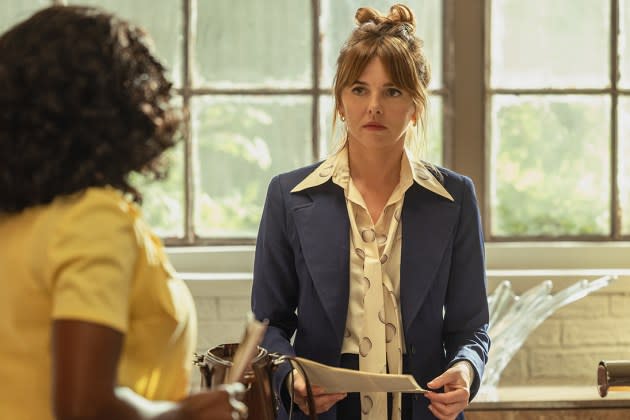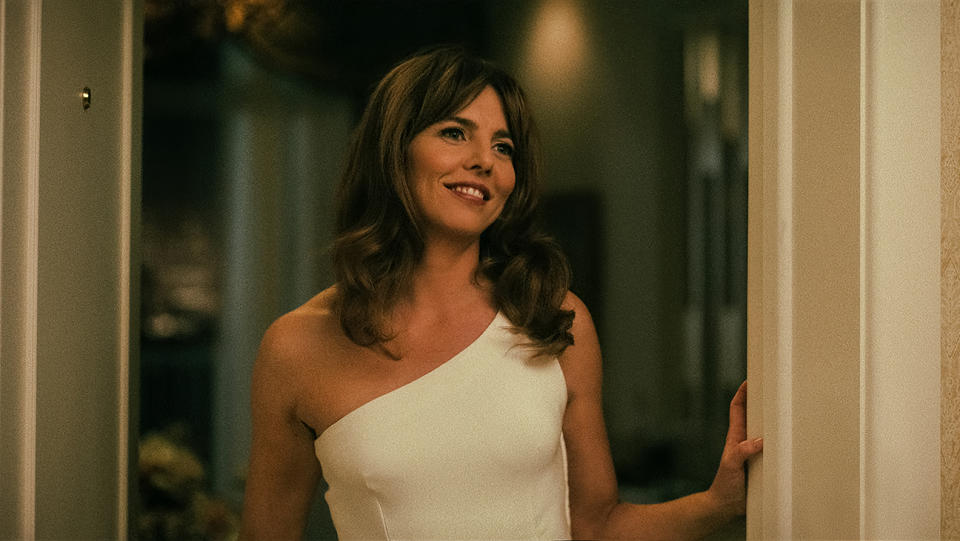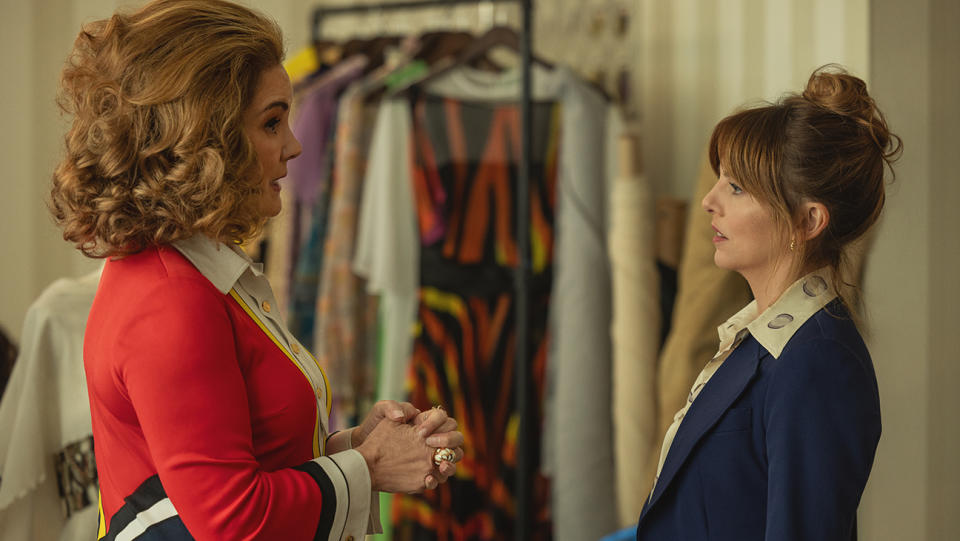‘Minx’ Star Ophelia Lovibond on the New Joyce-Doug Hierarchy and Second Wave Feminism in Season 2

[This story contains spoilers from Minx season two, episode four: “Life, Liberty and the Pursuit of Sexiness.”]
In Minx‘s second season, Ophelia Lovibond’s Joyce Prigger is finally wearing the pants when it comes to control over the magazine’s business and creative content decisions.
More from The Hollywood Reporter
Hollywood Offered Jake Johnson a Path to Mega-Stardom, He Chose a Regular Life
How 'Minx' Was Saved From Becoming "Filmsturbation" in Wild West Era of Streaming
'Minx' EP Paul Feig on HBO Max Cancellation and Why He'd Rather Release Shows on Linear TV
Her reunion with Jake Johnson’s publisher Doug Renetti — after his ego let her walk away from the magazine last season — has resulted in a new hierarchy at the publication (titled “Minx”). One where the magazine has returned better than ever, but with the financial backing of Elizabeth Perkins’ Constance Papadopoulos, a billionaire shipping magnate who has sparred with men for control in her own life.
And she has given Joyce majority control, allowing Minx’s co-founder and concept creator to finally envision the magazine how she wants — with fewer compromises.
“I think she’s enjoying the power and being able to pack her opinions with a punch,” Lovibond told The Hollywood Reporter in an interview conducted before of the SAG-AFTRA strike. “She doesn’t just express it and it goes into the ether. She’s monetizing those opinions and she’s making decisions. When she says no to Club Minx, it’s a no. She’s sorry. She’s not saying it gleefully, but it is her decision. So she’s stepping into making those decisions.”

But over the last four episodes of season two, Joyce is slowly finding that being the boss isn’t necessarily all its cracked up to be — and it’s certainly not easy for someone who is clearly competent but has more experience being the one questioning a leader’s decisions than the one being questioned.
“You see her struggling, like in the Vegas episode. She doesn’t have practice at doing it, because she’s been denied that because of the fact that she’s a woman growing up in the ’70s. I don’t think she’s understands the minutia of how to operate yet,” she explained. “That in itself, the fact that she’s making mistakes, exposes the fact that she has not had access to it. She hasn’t been able to do it. She is able to do it. She just needs to have longer at doing it.”
Lovibond added, “Doug’s been in a position of power for longer, so he’s had more practice of doing it. It’s like saying women are better at cleaning. They’re not. They just have had a lot more practice, so that’s why they’re better.”
So far this season, that’s meant Joyce’s decision-making has looked bold in some situations and hypocritical in others. That includes in the latest episode, “Life, Liberty and the Pursuit of Sexiness,” when she turns down Richie’s (Oscar Montoya) pitch for a bathhouse-themed magazine spread that would celebrate the male figure in Minx-style, but with a slightly different — a.k.a. gayer — eye in mind.
While some might see it as an opportunity to expand the magazine’s brand organically, Joyce turns it down rather clumsily. It’s a sequence that Lovibond said was not only significant to the conversations the show is trying to have in season two about intersectionality, but “was a really pivotal moment for me as well as an actor playing that moment.”
“Joyce doesn’t want to say no to him,” she continued. “The bathhouse spread — the pictures are beautiful. But she’s just been told by the woman who owns her, essentially — the woman who is paying and bankrolling everything — ‘we will lose our advertisers. This isn’t personal. This is a business decision. If you are going to prove yourself as a businesswoman you need to make this decision.’ If this magazine is aimed, as Constance sees it, at a certain demographic, we will lose our advertising and our sponsors if you don’t tow that party line.”
It’s one of the clearest moments of Joyce having to face the same kind of challenges as Doug, as someone who is both in charge of the business and someone who has personal relationships with those she manages. The difference this time is that Joyce refuses to be as blunt as her counterpart.
“Joyce is put in a really difficult position where she has to navigate pleasing the commercial financial backer and is trying to look after the content of her magazine that she’s developed from when she was a kid in her bedroom,” Lovibond said. “I think she’s trying to almost buy time. What she thinks is that she will be able to win Constance over if she can just keep people happy. That she will be able to show the second wave feminism of Constance’s opinion — which is not inclusive. We didn’t have the word intersectionality then, but Joyce wants that. So she’s like, ‘Let me just try and get a few more issues out and get Constance under my belt, and then I can include what Richie wants to do.'”

But that kind of thinking means that, even as someone who was once on the other side of the table, she’s missing “how devastating it is to him that she’s doing that.”
“Oscar and I spoke about that scene a lot because it was really hurtful to him that she’s just batting him away,” the Minx star added. “It’s Joyce making a mistake, but you can understand why she’s trying to please everyone, and she just goes about it in completely the wrong way. She makes mistakes. She messes up. She’s not perfect.”
The moment, like others in season two, captures how the Starz series is addressing the social and identity issues of the time, through a current lens and with a modern audience.
“There is a greater margin for error that is allowed to men than there is for women. Women mess up one time, they’re discounted. They’re no good. They don’t know what they’re doing. Men make mistakes, and it’s called experience,” Lovibond said. “Joyce is learning on the job how to manage people. And we’re looking at that through 2023 eyes. But this is 1973 and feminism then was very separated. There were some feminists who didn’t even want to entertain the idea of including lesbians.”
Lovibond underscores exclusion is not a position her character intentionally takes in season two, but Joyce’s decision in that moment with Richie does become a negative byproduct of her time in the power seat. It’s a seat that has seen Joyce’s ambition — and the new opportunities, attention and legitimacy that surround Minx magazine — distract from her initial mission and, at times, her own steadfast beliefs.
“It’s not by the fact that she’s got more power. She’s getting derailed by the fact that she’s believing her own hype,” she explained. “She’s worked so hard to get to where she has, but she’s also excited that she’s popular and people in bands will hang out with her. She was like the nerd in the libraries. I think that’s what actually derails her. It’s not the fact that she’s in a position of power and she doesn’t know what to do with it. It’s that she’s hanging out, taking coke with people from clubs, and she shouldn’t be doing that.”
Minx season two is airing on Starz.
Best of The Hollywood Reporter
